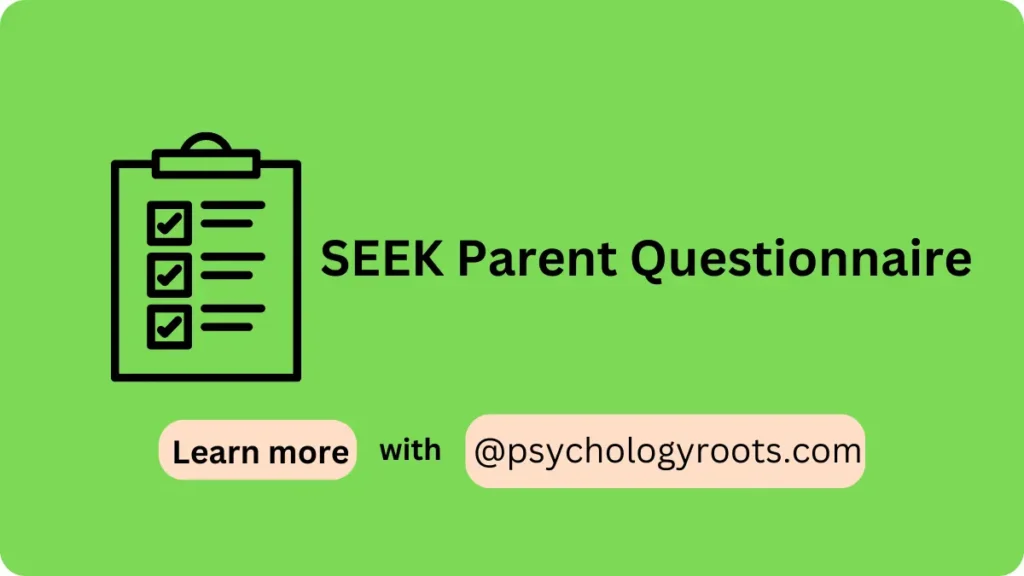Table of Contents
SEEK Parent Questionnaire
Here in this post, we are sharing the “SEEK Parent Questionnaire”. You can read psychometric and Author information. We have thousands of Scales and questionnaires in our collection (See Scales and Questionnaires). You can demand us any scale and questionnaires related to psychology through our community, and we will provide you with a short time. Keep visiting Psychology Roots.
About SEEK Parent Questionnaire
Scale Name
SEEK Parent Questionnaire
Author Details
Dr. Howard Dubowitz and his team at the University of Maryland School of Medicine.
Translation Availability
Vietnamese, Swedish, Sorani, Thai, Tigrinya, Turkish, Arabic, Bengali, Dari, Finnish, Kurmanji, Russian and Somali

Background/Description
The SEEK Parent Questionnaire is part of the Safe Environment for Every Kid (SEEK) model, designed to screen for major risk factors that can lead to child maltreatment. It assesses parental depression, substance abuse, harsh punishment, significant stress, intimate partner violence, and food insecurity. The SEEK model aims to integrate these screenings into routine pediatric care to identify and address these issues early, thereby enhancing the well-being of children and their families.
The questionnaire has been validated for use in primary care settings and is intended for parents or caregivers to complete before a child’s regular check-up. It helps pediatricians and other healthcare professionals to identify families at risk and provide appropriate interventions or referrals.
Administration, Scoring and Interpretation
- Preparation: Prior to the child’s check-up, parents or caregivers are given the SEEK PQ to fill out.
- Completion: The questionnaire includes straightforward questions about the family’s psychosocial environment, focusing on depression, substance use, stress, intimate partner violence, and food insecurity.
- Review: Healthcare professionals review the completed questionnaire.
- Intervention: Based on the responses, professionals engage in a brief discussion with the parent or caregiver, providing resources or referrals as necessary.
Reliability and Validity
The SEEK PQ has been evaluated in multiple studies and has shown significant reliability and validity. For example, in a federally-funded randomized controlled trial, the SEEK model resulted in a 31% reduction in Child Protective Services (CPS) reports and fewer instances of severe physical punishment. The model also demonstrated improved comfort and competence among healthcare providers in addressing psychosocial risk factors.
Available Versions
Maltiple-Items
Reference
Dubowitz, H., Feigelman, S., Lane, W., & Kim, J. (2009). Pediatric primary care to help prevent child maltreatment: the Safe Environment for Every Kid (SEEK) Model. Pediatrics, 123(3), 858-864. (Click here for more)
Important Link
Scale File:
Frequently Asked Questions
Q1: What is the primary purpose of the SEEK PQ?
A1: The SEEK PQ aims to identify and address major risk factors for child maltreatment by integrating psychosocial screening into routine pediatric care.
Q2: Who should complete the SEEK PQ?
A2: The questionnaire is intended for parents or caregivers of children aged 0-5 years old.
Q3: How often should the SEEK PQ be administered?
A3: It is typically administered before each routine pediatric check-up.
Q4: In what languages is the SEEK PQ available?
A4: The SEEK PQ is available in English, Spanish, Chinese, Swedish, Vietnamese, and Italian.
Q5: What happens if a parent screens positive on the SEEK PQ?
A5: Healthcare professionals will engage the parent in a brief discussion and provide appropriate resources or referrals based on the specific risk factors identified.
Q6: Is the SEEK PQ evidence-based?
A6: Yes, multiple studies have demonstrated the effectiveness of the SEEK PQ in reducing child maltreatment and improving healthcare providers’ competence in addressing psychosocial issues.
Disclaimer
Please note that Psychology Roots does not have the right to grant permission for the use of any psychological scales or assessments listed on its website. To use any scale or assessment, you must obtain permission directly from the author or translator of the tool. Psychology Roots provides information about various tools and their administration procedures, but it is your responsibility to obtain proper permissions before using any scale or assessment. If you need further information about an author’s contact details, please submit a query to the Psychology Roots team.
Help Us Improve This Article
Have you discovered an inaccuracy? We put out great effort to give accurate and scientifically trustworthy information to our readers. Please notify us if you discover any typographical or grammatical errors.
Make a comment. We acknowledge and appreciate your efforts.
Share With Us
If you have any scale or any material related to psychology kindly share it with us at psychologyroots@gmail.com. We help others on behalf of you.